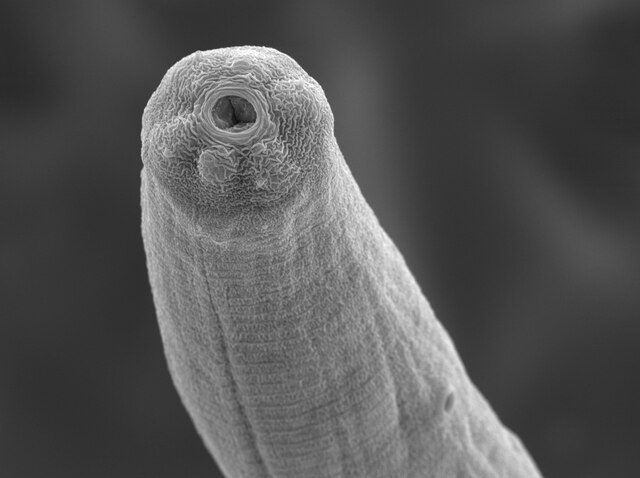
Ever heard of a nematode? You might be more familiar with their colloquial name, which is roundworm. For the purposes of this post, we’ll refer to this creature as a nematode going forward but know that nematodes and roundworms are the same creature. Nematodes are found all over the world and are classified as extremophiles, which means that they have the ability to survive in climates such as polar deserts, the deep biosphere, and inside animal intestines! Wikipedia even lists a species of nematode (Caenorhabditis elegans) as being able to survive atmospheric descent back to Earth’s surface.
Even though nematodes have a wide variety of quirks and interesting characteristics, you don’t need to make your way to the Arctic Circle to observe these creatures. Nematodes can be found in your backyard—millions per square yard of soil—and they’re commonly divided into two categories: beneficial and harmful nematodes. If you want to keep things simple, good and bad nematodes will also work.
“Good” Beneficial Nematodes – AKA “Entomopathogenic Nematodes”
Entomopathogenic defines an organism that infects and causes disease to insects.
You may be asking how is that a good thing? Fortunately for gardeners and growers, beneficial nematodes primarily target a multitude of soil-based plant pests as their hosts! These nematodes will parasitize and/or kill insects that are harmful to plants and they are considered non-toxic to humans and pets!
There are various species of entomopathogenic nematodes that exhibit different behaviors and pest insect preferences and have been studied in detail for their use against plant pests in agriculture for many years. Because of all of this research supporting their positive impact, the great news for you is that they are commercially reared and available for you to use in your own garden!
Using beneficial nematodes to control unwanted plant pests reduces the need for chemical pesticides, which in turn eliminates the frequent harmful byproducts found in commercial pesticides that can cause lasting environmental damage.
Beneficial nematodes are effective against over 200 common pest insects including grubs, fleas, fungus gnats, beetles, weevils and more! To determine what type is most effective for the pests you are dealing with, you can read this pest selection guide!
“Bad” Nematodes – AKA “phytopathogenic Nematodes”
Phytopathogenic defines an organism that is parasitic to plants.
Harmful nematodes, such as root knot nematodes (Meloidogyne incognita) and cyst nematodes (Glob Odera pallida), are notorious for their damaging effects on plants. These nematodes invade plant roots, causing galls and lesions that disrupt nutrient and water uptake. Once infested by the parasitic nematode, the plant will have stunted growth and will begin yellowing.
Parasitic infections aren’t the only negative effect certain species of harmful nematodes can have on your plants. For example, the root-lesion nematodes of the Pratylenchid genus are known to carry fungal pathogens that cause root rot. As the nematode feeds on the plant’s roots, entry points are created for root rot pathogens. While the overall effects of parasitic and disease-carrying nematodes both result in plant death, disease-carrying nematodes attack plants on two fronts: the physical damage to the plant from root eating and the damage caused by diseases entering the damaged root system.
What about me? There are nematode species like Ascaris, Trichinella, and hookworms that can infect humans and livestock, but they are very different from the kind that are available for commercial pest control use. These malignant nematodes primarily target and inhabit the intestines of animals causing symptoms ranging from mild gastrointestinal discomfort to severe malnutrition and organ damage. The nematodes discussed above in this post are all species that are harmful to either plants or insects, and they pose no known risks to humans and animals and can be applied without concern near homes, pets and children!
Founded in 1979 in Arizona, today ARBICO Organics continues to produce innovative means of natural biological pest control and fertilizer for the hobbyist and professional grower alike.


Comment here